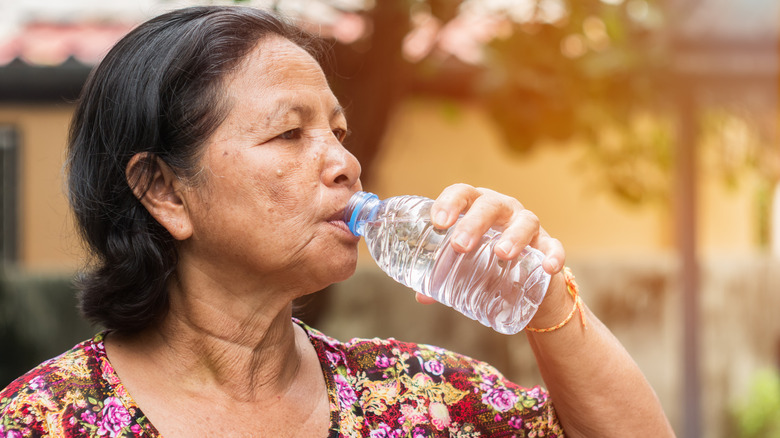Can Good Hydration Slow The Aging Process? Here's What Experts Say
While all of us will experience the natural changes that come with aging, some people may age faster than others. Smoking, sun exposure, a lack of sleep, and high levels of stress can all accelerate the aging process. However, researchers continue to uncover various factors that may help us pump the brakes when it comes to aging.
One such factor appears to be hydration. In a 2023 study published in eBioMedicine, researchers monitored the health status of more than 11,000 participants between the ages of 45 to 66 over a 25-year period to determine if hydration may play a role in slowing the process of aging.
As a biomarker of hydration (or lack thereof), the study team measured participant serum sodium levels. While sodium is critical in keeping our fluid levels balanced, having high levels of sodium in the blood has been linked to dehydration, which can lead to a condition known as hypernatremia, according to research published in Merck Manual. The study findings showed that those who had higher serum sodium levels were more likely to be biologically older than their chronological age.
Dehydration may accelerate signs of aging
The study team outlined in their research that the normal range of serum sodium levels falls between 135 to 146 millimoles per liter (mmol/l). It was found that participants whose sodium levels exceeded 142 mmol/l were 39% more susceptible to chronic disease — and 50% more likely to show signs of aging beyond their chronological age (otherwise known as their biological age). A greater risk of chronic disease and early death was found in connection with increased biological age. While further research is still needed, the study team points out that dehydration is a major contributing factor in increased serum sodium levels, subsequently highlighting the importance of adequate hydration.
However, failing to drink enough water isn't the only factor that can throw one's fluid balance out of whack as we age. Natural bodily changes also make it harder for the body to hold on to fluid, such as increased urine output from the kidneys as we grow older (via Merck Manual). Older adults also tend to take more medications, some of which can exacerbate fluid loss. On average, while fluid makes up 60% of a younger person's body weight, this number drops to 45% in older individuals.
Strategies to keep yourself hydrated
While age-related changes in the body may not be entirely preventable, experts point out that we can modify certain lifestyle factors to reduce the risk of health problems as we age. Diet, for instance, can increase sodium levels in the body. This poses potential health risks if we're eating salty foods in excess. In addition to dehydration, overconsumption of salt can increase one's risk for hypotension, heart disease, and weight gain. Therefore, taking protective measures, like minimizing one's salt intake and drinking plenty of water, can help preserve our health as we age.
To ensure you're staying adequately hydrated, experts at Nebraska Medicine University Health Center suggest drinking a glass of water as soon as you wake up and before each meal throughout the day. If plain water isn't your favorite, try sparkling water or seltzer instead. These are more hydrating options compared to soda or coffee, which act as diuretics due to their caffeine content and can increase the risk for dehydration. Generally speaking, men are advised to drink approximately 16 cups of water daily and women are advised to drink 11 cups each day.



